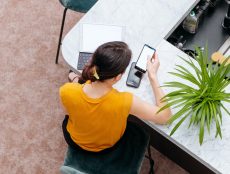
Articles
Higher Education
K-12
U.S. Department of Education’s FY 2019 Annual Plan Includes Increased Scrutiny of Online Learning
By Cait Etherington
December 11, 2018
Although the current administration in Washington continues to enthusiastically embrace online learning, in 2019, online learning may face heightened scrutiny. In late November, the U.S. Department of Education released its FY 2019 Annual Plan. Over the coming year, the Department of Education promises to take a closer look at the activities of online program management providers and virtual schools.
Heightened Scrutiny of Online Program Management Providers
U.S. colleges and universities increasingly rely on online program management providers. These are companies like 2U that help colleges and universities develop and deliver online courses and programs. As stated in the FY 2019 Annual Plan, in 2019, the U.S. Department of Education hopes to investigate three key issues raised by online program management providers:
“(1) the nature and extent of services that online program management providers offer to selected schools, (2) the extent to which selected schools disclose relationships with online program management providers to students, and (3) whether selected school contracts with online program management providers that include student recruitment are consistent with the intent of the incentive compensation regulations.”
The heightened scrutiny of online program management providers is not necessarily driven by concerns about the quality of the educational experiences these providers offer. Ultimately, it is about ensuring federal funds are being properly dispersed. As stated in the Department of Education’s 2019 plan, “Effective oversight and monitoring of participants is necessary to ensure that funds are disbursed for only eligible students and to effectively manage the performance of the Federal student loan portfolio. Within this area, our planned audit work includes schools’ use of online program management providers.”
FY 2019 Annual Plan Also Calls for Investigation of IDEA Compliance
One doesn’t need to dig too deep to discover that there are growing concerns about the quality of virtual schools at the K-12 level. As recently reported on eLearning Inside, in October, Democratic Senator Patty Murray from Washington and Senator Sherrod Brown from Ohio asked the Government Accountability Office to investigate virtual charters. According to Senator Murray and Senator Brown, “Research on virtual charter schools shows that students attending such schools perform much worse than their peers receiving in-person instruction in traditional, brick-and-mortar public schools.”
While the FY 2019 Annual Plan does not address most of Senator Murray and Senator Brown’s concerns (their letter addressed to the Comptroller General can be read in its entirety here), it does call for heightened oversight of at least one issue flagged by the senators: virtual schools’ compliance with the Individuals with Disabilities Education Act (IDEA).
As clearly stated in the FY 2019 Annual Plan, over the coming year, the U.S. Department of Education will carry out a thorough investigation to determine whether state departments of education are upholding the educational rights and protections afforded to children with disabilities under the IDEA who attend virtual charter schools. They will also investigate whether state and local educational agencies have “sufficient internal controls to ensure that individualized education plans are developed for children with disabilities who attend virtual schools and that these students are provided with services described in their individualized education plans.”
Does the FY 2019 Annual Plan Go Far Enough?
Many critics will be disappointed with the FY 2019 Annual Plan. However, given the current administration’s enthusiasm for online learning, it is somewhat surprising that the 2019 plan calls for any heightened scrutiny of online programs and schools. Also, online program management providers and virtual schools won’t be the only programs and organizations receiving heightened attention in 2019. The need for regular audits is obvious when one looks at the numbers. The U.S. Department of Education oversees more than 100 programs in more than 18,000 public school districts for over 50 million students attending more than 98,000 public schools.
Photo by Agence Olloweb on Unsplash.









No Comments